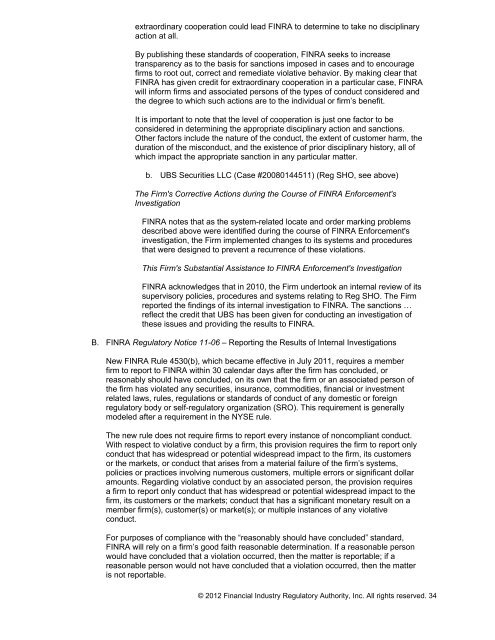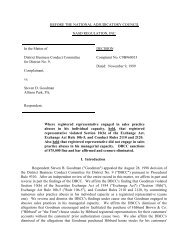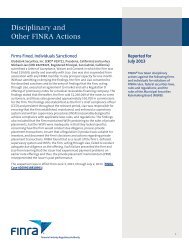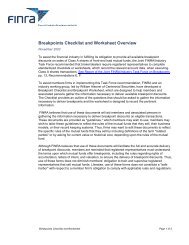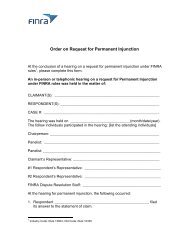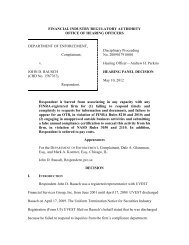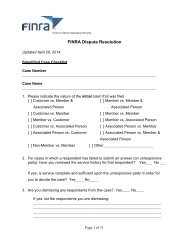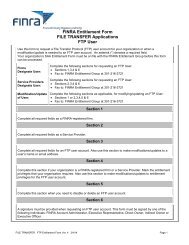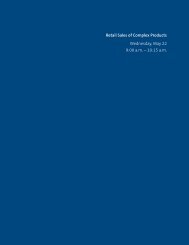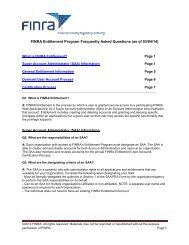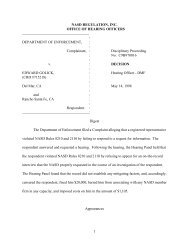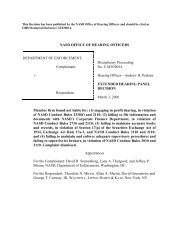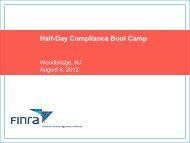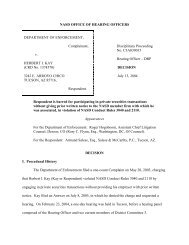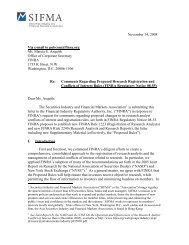2012 FINRA Annual Conference Materials - May 23 Session
2012 FINRA Annual Conference Materials - May 23 Session
2012 FINRA Annual Conference Materials - May 23 Session
Create successful ePaper yourself
Turn your PDF publications into a flip-book with our unique Google optimized e-Paper software.
extraordinary cooperation could lead <strong>FINRA</strong> to determine to take no disciplinary<br />
action at all.<br />
By publishing these standards of cooperation, <strong>FINRA</strong> seeks to increase<br />
transparency as to the basis for sanctions imposed in cases and to encourage<br />
firms to root out, correct and remediate violative behavior. By making clear that<br />
<strong>FINRA</strong> has given credit for extraordinary cooperation in a particular case, <strong>FINRA</strong><br />
will inform firms and associated persons of the types of conduct considered and<br />
the degree to which such actions are to the individual or firm’s benefit.<br />
It is important to note that the level of cooperation is just one factor to be<br />
considered in determining the appropriate disciplinary action and sanctions.<br />
Other factors include the nature of the conduct, the extent of customer harm, the<br />
duration of the misconduct, and the existence of prior disciplinary history, all of<br />
which impact the appropriate sanction in any particular matter.<br />
b. UBS Securities LLC (Case #20080144511) (Reg SHO, see above)<br />
The Firm's Corrective Actions during the Course of <strong>FINRA</strong> Enforcement's<br />
Investigation<br />
<strong>FINRA</strong> notes that as the system-related locate and order marking problems<br />
described above were identified during the course of <strong>FINRA</strong> Enforcement's<br />
investigation, the Firm implemented changes to its systems and procedures<br />
that were designed to prevent a recurrence of these violations.<br />
This Firm's Substantial Assistance to <strong>FINRA</strong> Enforcement's Investigation<br />
<strong>FINRA</strong> acknowledges that in 2010, the Firm undertook an internal review of its<br />
supervisory policies, procedures and systems relating to Reg SHO. The Firm<br />
reported the findings of its internal investigation to <strong>FINRA</strong>. The sanctions …<br />
reflect the credit that UBS has been given for conducting an investigation of<br />
these issues and providing the results to <strong>FINRA</strong>.<br />
B. <strong>FINRA</strong> Regulatory Notice 11-06 – Reporting the Results of Internal Investigations<br />
New <strong>FINRA</strong> Rule 4530(b), which became effective in July 2011, requires a member<br />
firm to report to <strong>FINRA</strong> within 30 calendar days after the firm has concluded, or<br />
reasonably should have concluded, on its own that the firm or an associated person of<br />
the firm has violated any securities, insurance, commodities, financial or investment<br />
related laws, rules, regulations or standards of conduct of any domestic or foreign<br />
regulatory body or self-regulatory organization (SRO). This requirement is generally<br />
modeled after a requirement in the NYSE rule.<br />
The new rule does not require firms to report every instance of noncompliant conduct.<br />
With respect to violative conduct by a firm, this provision requires the firm to report only<br />
conduct that has widespread or potential widespread impact to the firm, its customers<br />
or the markets, or conduct that arises from a material failure of the firm’s systems,<br />
policies or practices involving numerous customers, multiple errors or significant dollar<br />
amounts. Regarding violative conduct by an associated person, the provision requires<br />
a firm to report only conduct that has widespread or potential widespread impact to the<br />
firm, its customers or the markets; conduct that has a significant monetary result on a<br />
member firm(s), customer(s) or market(s); or multiple instances of any violative<br />
conduct.<br />
For purposes of compliance with the “reasonably should have concluded” standard,<br />
<strong>FINRA</strong> will rely on a firm’s good faith reasonable determination. If a reasonable person<br />
would have concluded that a violation occurred, then the matter is reportable; if a<br />
reasonable person would not have concluded that a violation occurred, then the matter<br />
is not reportable.<br />
© <strong>2012</strong> Financial Industry Regulatory Authority, Inc. All rights reserved. 34


